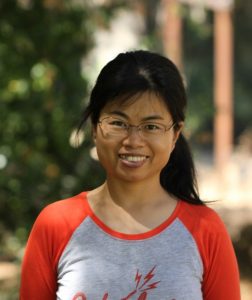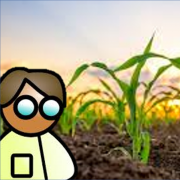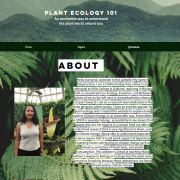Informational interview with Dr. Shouling Xu, Director of the mass spectrometry facility at Carnegie Institution of Science
By Yanniv Dorone, Conviron Scholar
 Dr. Shouling Xu is a mass spectrometrist and a biologist in the Department of Plant Biology at Carnegie Institution of Science. She obtained her PhD at the University of North Carolina at Chapel Hill, where she worked in Joe Kieber’s lab. After this, she did a postdoc in Zhiyong Wang’s lab at Carnegie and in Al Burlingame’s lab at UCSF.
Dr. Shouling Xu is a mass spectrometrist and a biologist in the Department of Plant Biology at Carnegie Institution of Science. She obtained her PhD at the University of North Carolina at Chapel Hill, where she worked in Joe Kieber’s lab. After this, she did a postdoc in Zhiyong Wang’s lab at Carnegie and in Al Burlingame’s lab at UCSF.
1) What is your position and what does your job involve?
I direct a mass spectrometry facility at Carnegie. I collaborate with various labs both at Carnegie and Stanford by helping them apply proteomic tools to drive biological studies. We measure protein identity, abundance, post-translational modifications, and identify their social network (protein-protein interactions). I also carry out my own research, which focuses on developing proteomic tools and analyzing the structural information of protein complex assembly.
2) What are you job’s biggest challenges?
One of biggest challenge is getting grants to upgrade instruments and hire hands. Another one is navigating through multiple collaborations at the same time.
3) What brought you to plant biology?
I grew up in a small village near Lake Gaoyou in China. My parents were both farmers and we planted rice and wheat every year. However, my parents thought I would not be a good farmer, since I was very slow at planting rice seedlings in puddled fields. That being said, I naturally developed a strong interest in plants. I was curious about how they grow and how to get better yields. More generally, I was very curious about biology, but I couldn’t see myself killing a mouse or a rabbit, so plant biology was the best choice on all fronts.
4) You worked at Thermo before starting your position at Carnegie. Why did you decide to go back to academia?
I was at Thermo’s proteomic marketing department, where I was working in a diverse team of engineers and other experts to develop a product. It was a great experience! My interest in going back to academia started with the fact that during multiple academic seminars at Thermo, I noticed that while the animal field has benefited a lot using mass spectrometry technique, the plant field has not. So when the department of plant biology at Carnegie decided to have its own mass spectrometry facility, I was very excited to go back. Carnegie has a great platform with original and creative research. I am happy to bring proteomic tools to advance plant science.
5) What are the main differences between academia and industry?
I love both, and I have learned a lot from each one. First, let’s start with what’s in common: science and relationships (e.g. how to deal with people) are at heart of both. The main difference, in my opinion, is that industry projects are more short-term, while, in academia, a lot more time is given to carry out basic research and tackle fundamental problems.
6) What do you think are the most important considerations to take into account when choosing your career?
I would say personal growth. It has to be a job where you feel like you are developing both intellectually and as a person. I would not say that financial considerations are as important, unless you have a family or want to start one.
7) What advice would you give to students who are near the end of their PhD?
I would first say remain calm! While you finish writing, you should attend different meetings and seminars and think about the next stage. Ask yourself what interests you the most. If you want to stay in research, I would go into a different field or topic. I think that it’s important to become interdisciplinary and carve out a unique niche. This would give you a strong advantage in the job market
8) Finally, could you share a few fun facts about you?
I have a very naughty and curious 3-year son! Outside of work, I love readings, dancing Zumba and playing tennis.





